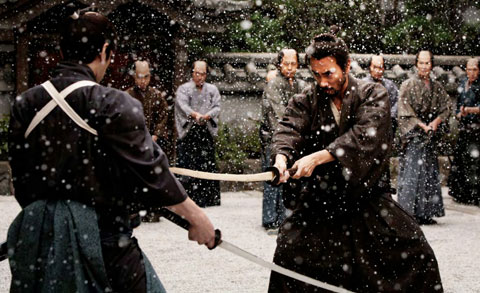
REMAKING A CLASSIC Takashi Miike (Audition) updates Masaki Kobayashi in Hara-kiri: Death of a Samurai. |
It's a precarious moment for lovers of classic films and, indeed, film itself. As is widely known, most contemporary films both large and small are now being shot on digital formats, and cinemas continue to transfer from film to exclusively digital projectors. That is one matter. Quite another is that major studios are steadily refusing to distribute their archival prints of classic films. As a result, repertory theaters and independent cinemas with classics sidebars face a tricky dilemma: show the films they desire in a less textured digital format, or take on an underdog role and show all the film they can.
The Maine International Film Festival, beginning its fifteenth installment this Friday and running through July 22, makes a rousing case for the underdog this year. Alongside a fine slate of new local, domestic, and international films, the two-week, Waterville-based fest offers a striking array of classics both epic and obscure.
What follows is a minuscule selection of the couple dozen films worth checking out over the next fortnight.
GOODFELLAS For a master class in Thelma Schoonmaker's art of editing, look no farther. Martin Scorsese's 1990 classic features both the cuts that made Joe Pesci's exhaustive, pugnacious rhetorical interrogation/attacks a cliché, and the lack of cuts that transformed Henry Hill's (Ray Liotta) long walk through the back door of a nightclub into an iconic American ascent.
AI WEIWEI: NEVER SORRY This eagerly anticipated documentary relays the story of how China's most famous artist became the country's most prominent critic. Director Alison Klayman captures the artist at work on his art, and tweaking government censors.
CHICKEN WITH PLUMS While shot with real actors (notably Mathieu Amalric, of The Diving Bell and the Butterfly), Marjane Satrapi's latest adaptation of one of her graphic novels (after Persepolis), co-directed by Vincent Paronnaud, looks as expressive and animated as her debut. In the film, Amalric's aging Iranian musician skips through his life to relay the story of his great lost love.
THE STUDENT (EL ESTUDIANTE) The young Argentinean director Santiago Mitre's film, shot with a tiny budget, has become a huge hit in its native country, in no small part due to the politically piquant timing of its release in a country marked by student unrest. In it, a college dropout falls for a political campaign operative and then works his way into the race, armed with the words of a script sharp enough to warrant comparisons to Aaron Sorkin.
HARA-KIRI: DEATH OF A SAMURAI The notoriously prolific and often brilliant (Audition) Japanese director Takashi Miike follows up his very satisfying samurai bloodbath 13 Assassins with a somewhat more muted samurai yarn, a remake of Masaki Kobayashi's 1963 classic, Harakiri.
THE LONG DAY CLOSES While there is no shortage of repertory epics at MIFF this year, take a moment for a smaller tale, evocatively told. American audiences are relatively unfamiliar with the work of British director Terence Davies (The House of Mirth), but if you caught the rapturous opening to his recent movie with Rachel Weisz, The Deep Blue Sea, you'll get a fine indication of his impressionistic, practically Proustian work in documentary and hybrid films. This film, from 1992, sees the world through the eyes of a sheltered young boy obsessed with movies, sounds and clips of which run fluidly through this otherwise simple tale.
Maine International Film Festival | July 13-22 | at Railroad Square Cinema and Waterville Opera House, in Waterville | individual screenings $9-12, festival passes $85-200 | miff.org